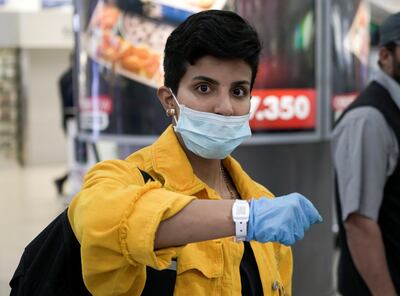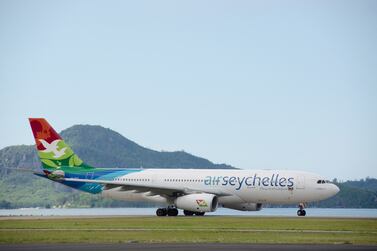Kuwait is hoping to boost confidence in air travel by using a sophisticated web application that collects and confirms passengers’ Covid-19 test results, vaccination records and quarantine arrangements.
Like many countries, Kuwait is searching for ways to safely ramp up air travel amid the pandemic, during which this small nation of 4.7 million people has suffered more than 300,000 infections.
For more than a year, Kuwait has greatly restricted who’s allowed to cross its borders in a bid to contain Covid-19, but is now seeking to facilitate freer movement in and out of the country. To achieve this safely, it has rolled out the KuwaitMosafer app, which is mandatory for all international travellers to Kuwait, and helps to collate and share key medical documents related to the coronavirus.

Anyone travelling in or out of the country must register on KuwaitMosafer – pioneered by Kuwait's National Aviation Services (NAS) – which confirms their vaccination record, Covid-19 test results and quarantine accommodation in the Gulf country.
Kuwait began its national rollout of vaccinations in December and has so far administered more than 1.8 million doses to its citizens and residents.
It is not accepting tourists yet and, unless they have been fully vaccinated, all returning Kuwait citizens and accredited workers must provide a negative PCR test and then complete either a seven or 14-day quarantine on arrival.
KuwaitMosafer is also being used to share Kuwait’s official vaccine records with other countries and airlines via the Common Trust Network, created by the World Economic Forum. This network allows the secure sharing of verifiable Covid-19 vaccinations and test results.
It does this by using a global network of certified laboratory and vaccination sources, standardised formats for all medical records, as well as standardised tools for digital access to all this information. NAS Group chief executive Hassan El Houry says KuwaitMosafer was the first app of its kind rolled out by any country, and that more than 700,000 passengers have so far used the service.
“KuwaitMosafer has helped reassure passengers they can travel safely with complete personal data confidentiality,” El Houry tells The National.
“In terms of development, the platform has quickly adapted and keeps evolving to keep up with the regulations put in place by the local authorities. Overall, the effectiveness of KuwaitMosafer can be seen with the growing number of passengers travelling from and to Kuwait.”
El Houry says the app has also helped tackle the problem of forged Covid-19 vaccine certificates and test results, by introducing the Medical Utility Network Accreditor. This patented blockchain technology connects Covid-19 test labs in different countries to verify certificates and test results for cross-border travel.
KuwaitMosafer is linked to this MUNA network, allowing authorities to share authenticated PCR test results from 100 audited labs. This co-ordination has already had a significant impact on the health security of Kuwait’s borders, according to El Houry.
“We discovered that the number of positive cases entering the country was three times higher before MUNA was introduced,” he says. “This suggests a significant reduction in infected cases entering the country with forged certificates or fake results.”
The issue of such counterfeit documents came to light in February when an Indian lab technician working in Kuwait was arrested for selling fake Covid-19 test results. The technician was allegedly charging about $99 to issue his clients with negative Covid-19 results, despite not doing a PCR test.
Kuwait isn’t only placing tough restrictions on incoming travellers. It is also taking a hardline approach with Kuwaiti citizens who wish to fly out of the country. On May 22, the government placed a foreign travel ban on any of its citizens who have not received a Covid-19 vaccination.
The nation is aiming to get its population fully vaccinated so it can reopen its borders and El Houry believes KuwaitMosafer can play a key role in helping the country open back up to the world.
“As people start looking towards resumption of air travel, health is a priority and the digitisation of testing and vaccine data have a leading role to play,” he says. “KuwaitMosafer checks all the boxes and is now preparing for the country to open its door for the return of expats and visitors in the near future.”






